Suchergebnisse für "Factsheet%3A Energietechnologien gestalten%2C die f%C3%BCr alle sinnvoll und nutzbar sind"
Supermärkte als Energiezentralen
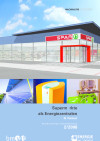
Schriftenreihe
02/2006
M. Peritsch
Deutsch, 442 Seiten
Downloads zur Publikation
Krankenhaus der Zukunft
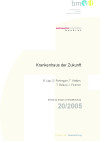
Schriftenreihe
20/2005
B. Lipp, G. Rohregger, T. Waltjen, T. Belazzi, J. Fechner
Deutsch, 174 Seiten
Downloads zur Publikation
Das Ökologische Passivhaus
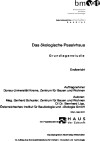
Schriftenreihe
27/2001
G. Schuster, B. Lipp
Deutsch, 174 Seiten
Downloads zur Publikation
Einbringsysteme für Biogasanlagen
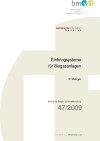
Schriftenreihe
47/2009
R. Metzger
Herausgeber: BMVIT
Deutsch, 44 Seiten
Downloads zur Publikation
PV Power Update
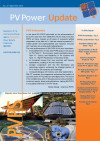
Herausgeber: IEA-PVPS
Englisch, 8 Seiten
Downloads zur Publikation
Kriterienkatalog Plus-Energiesanierung
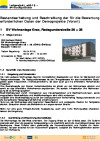
Sonja Geier, Armin Knotzer
Herausgeber: BMVIT
Deutsch, 30 Seiten
Downloads zur Publikation
Passivhaussanierung Kierling (Umsetzung)
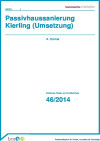
Schriftenreihe
46/2014
A. Donner
Herausgeber: BMVIT
Deutsch, 72 Seiten
Downloads zur Publikation
Demoobjekt energieautarke Solarfabrik
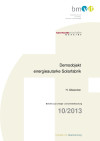
Schriftenreihe
10/2013
H. Gösweiner
Herausgeber: BMVIT
Deutsch, 34 Seiten
Downloads zur Publikation
S-House

3/2005
Herausgeber: BMVIT
Deutsch, 6 Seiten
Downloads zur Publikation
Weiterentwicklung einer Optimierungsmethode
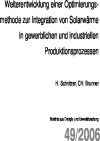
Schriftenreihe
49/2006
H. Schnitzer, Ch. Brunner
Deutsch, 90 Seiten
Downloads zur Publikation
Strohpellets für Kleinfeuerungsanlagen
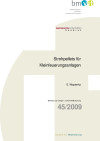
Schriftenreihe
45/2009
E. Wopienka
Herausgeber: BMVIT
Deutsch, 125 Seiten
Downloads zur Publikation
First passive-house school reconstruction

Factor 10 refurbishment of the General Secondary School II and Polytechnic School of Schwanenstadt (Upper Austria) with prefabricated wooden façade elements and with a comfort ventilation system.
BIGMODERN Subproject 7: Monitoring concept
Development of a pattern for comprehensive documentation of the project results. The concepts contain amongst others monitoring of energy consumption, resources, costs, functionality and comfort, etc.
Energy system - Industrial region
Analysis of success factors, restrictions and risks on the development and implementation process caused by the system integration of renewable energy technology in industrial regions with higher energy demand.
Documentation, comparison and processing of demonstration results on the topic of "Digital Building Twin"
The aim of the project was to compare results from two demonstration projects of a digital building twin and to document initial operational experiences.
Biomass-Logistic-Centers
By establishing regionally best situated logistic centers it shall be guaranteed that in all of Styria transport and processing costs will be reduced and that a continual supply of biomass firewood of constant quality is ensured.
IEA Energy in Buildings and Communities Programme (EBC TCP)
The Energy in Buildings and Communities Programme by the IEA enables collaborative research and development projects. Thematically, it focuses on integrating energy efficient and sustainable technologies in buildings and communities.
Innovative Use Of Austrian Stove Fitting Technology For A Sustainabl Development
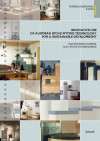
Tile stoves in Austria - Clay stoves in Zimbabwe
Forschungsforum
2/2000
Herausgeber: BMVIT
Englisch, 6 Seiten
Downloads zur Publikation
Smart Cities Tag 2020
16. und 17. Juli 2020
Alpenhotel Gösing, 3221, Gösing an der Mariazellerbahn 4
